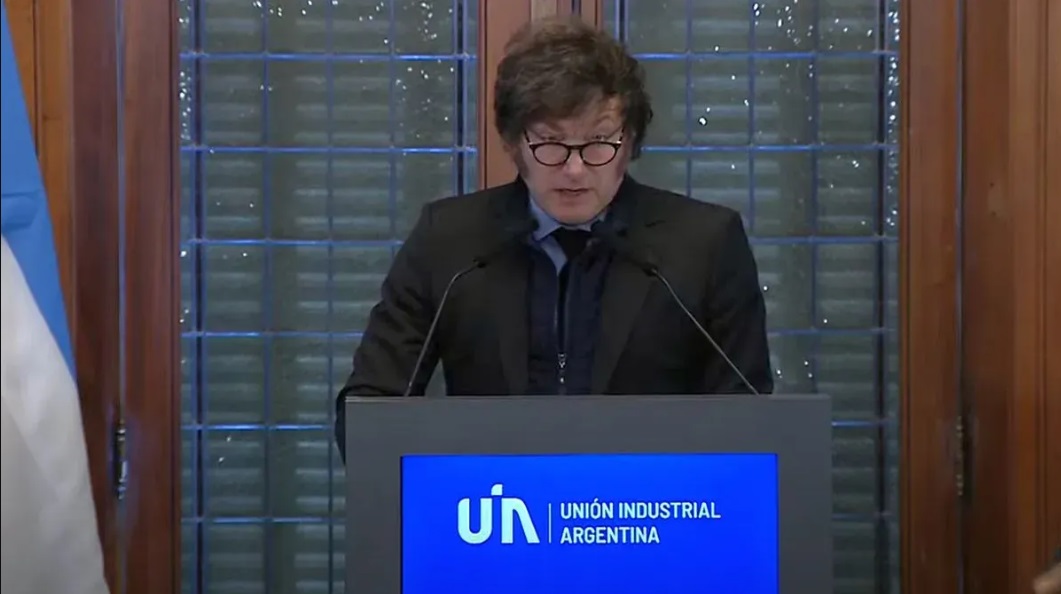
With the aim of increasing the State’s revenue and favouring the accumulation of dollars in the Central Bank, the Minister of Economy Luis Caputo had increased the PAIS tax that affects all imports from 7.5% to 17.5%. This Monday the Government returned it to its previous level and Javier Milei promised businessmen to eliminate the tax by December. Although this measure lowers the costs of the industry that depends on imported inputs, the sector has been so hard hit by the adjustment and the economic plan that it is difficult to find signs of a recovery.
In his speech at the Argentine Industrial Union (UIA) on Monday, Javier Milei defined himself as an “ally” of the private sector and promised them a “genuine industrial boom”, recalling Mauricio Macri’s illusion of a rain of investments that never came. So far, the Government has been destroying the productive capacity of the sector as a consequence of the collapse of consumption, due to the collapse of salaries.
The figures show a deterioration in the industry comparable only to the worst crises in the country’s history. In June 2024, the use of installed capacity in the industry stood at 54.5%, a level lower than that of the same month in 2023, which was 68.6%. The production index registered a 20.1% drop in June compared to a year ago. Businessmen have already begun to take advantage of the situation to make layoffs and threaten to multiply them. A report by the Center for Political Economy of Argentina (CEPA) indicated that between November 2023 and June 2024, 34,000 jobs were lost in the industry.
The President, supporting this decision by the capitalists, told them that he considers labor costs to be a monster and added: “There is no company in the world that can compete with these labor costs, which are the result of outdated regulations that supposedly aim to protect workers but only destroy jobs.” An argument that has been refuted by reality countless times. Without going any further, the sector with the highest number of layoffs under Milei’s administration is construction, which has the fewest “regulations.”
In the collapse caused by neoliberal policies, losses are not for everyone, even large companies have multiplied their profits despite the drop in sales. As in the case of La Serenísima, which earned more than $56 billion in the first half of 2024, while poverty affects 7 out of 10 children in Argentina and milk consumption is falling.
At the UIA, Milei also argued that Argentine industries in recent years “have become increasingly dependent on the State” and that this process began in the middle of the last century when “it was decided that everything had to be produced here,” but that in order to “protect the industry, the countryside was robbed.” The President was direct: “There are few of us and we know each other well, boys, you have enjoyed the approval that all Argentines gave you in subsidies, exemptions and tariffs on competition. You had decades of hunting in the zoo.” A typical exaggeration of liberals in dependent countries; there is no case in the world of an industrial conglomerate that has managed to emerge without protectionist measures.
The Government has already been implementing measures in this regard by eliminating or lowering import tariffs. Import tariffs are being reduced for white goods such as refrigerators and washing machines (from 35% to 20%), as well as tires (35% to 16%) and plastic inputs (12.6% to 6%).
Continuing along those lines, the President quoted Carlos Menem and pointed out that the economic change he is promoting will require industrialists to “learn to ride a bicycle without training wheels.” During his administration, between 1989 and 1999, industrial production went from representing 42% of GDP to 26% (according to World Bank data).
To prevent unemployment from soaring, the distribution of working hours is the most effective measure. If the 12,000 main companies in the country, which have earned millions, could implement a reduction of the working day to 6 hours without a reduction in wages, distributing the freed-up working hours and with a minimum wage that covers the family basket, updated month by month according to inflation, 1 million jobs would be created. But a country with a weak industry will find it difficult to get out of backwardness and dependency, and only by lowering taxes is it impossible to reverse this condition. For this reason, a rational planning of the entire economy is necessary to direct the resources produced in the country in accordance with technological progress that will allow changing the living conditions of the great majority.
Source: www.laizquierdadiario.com

